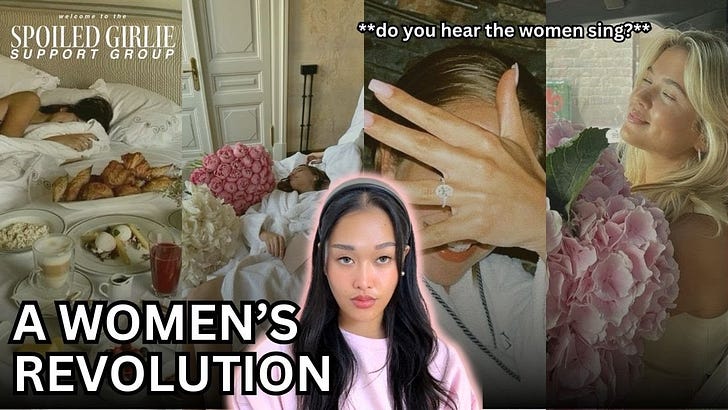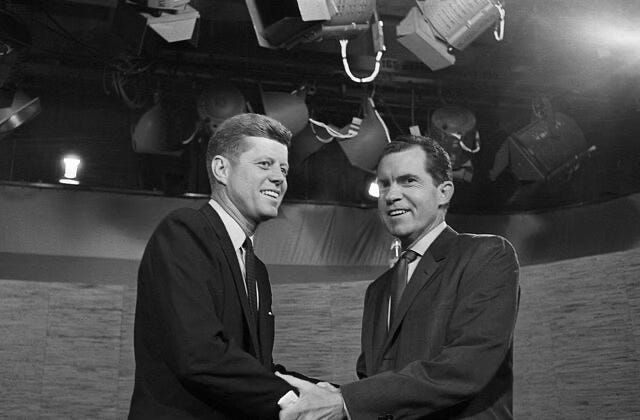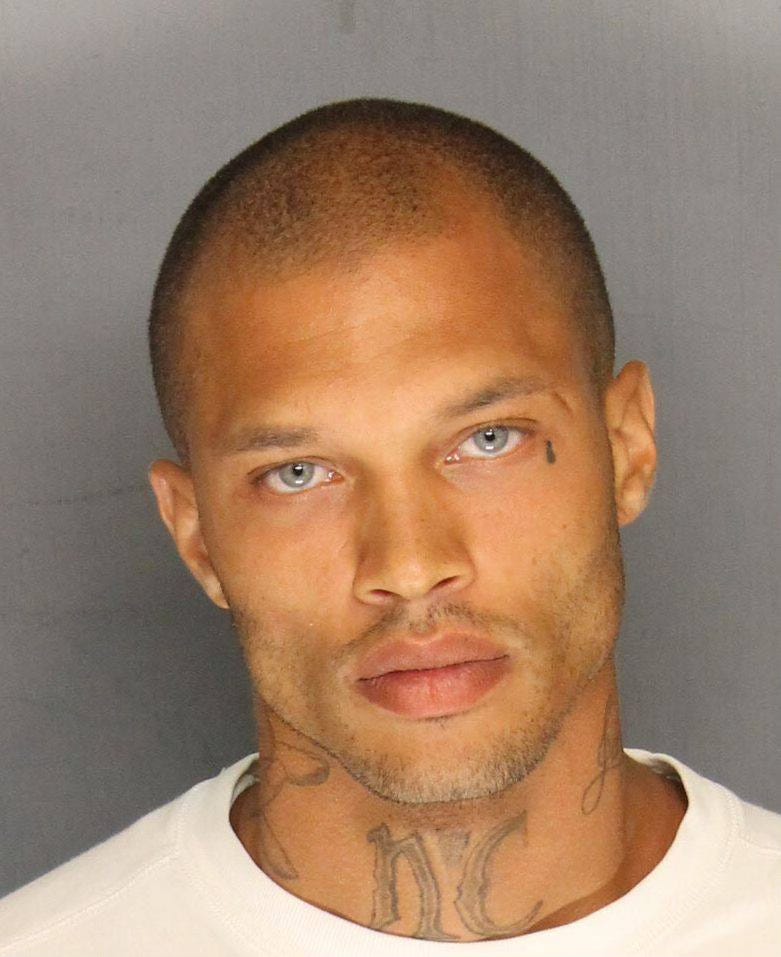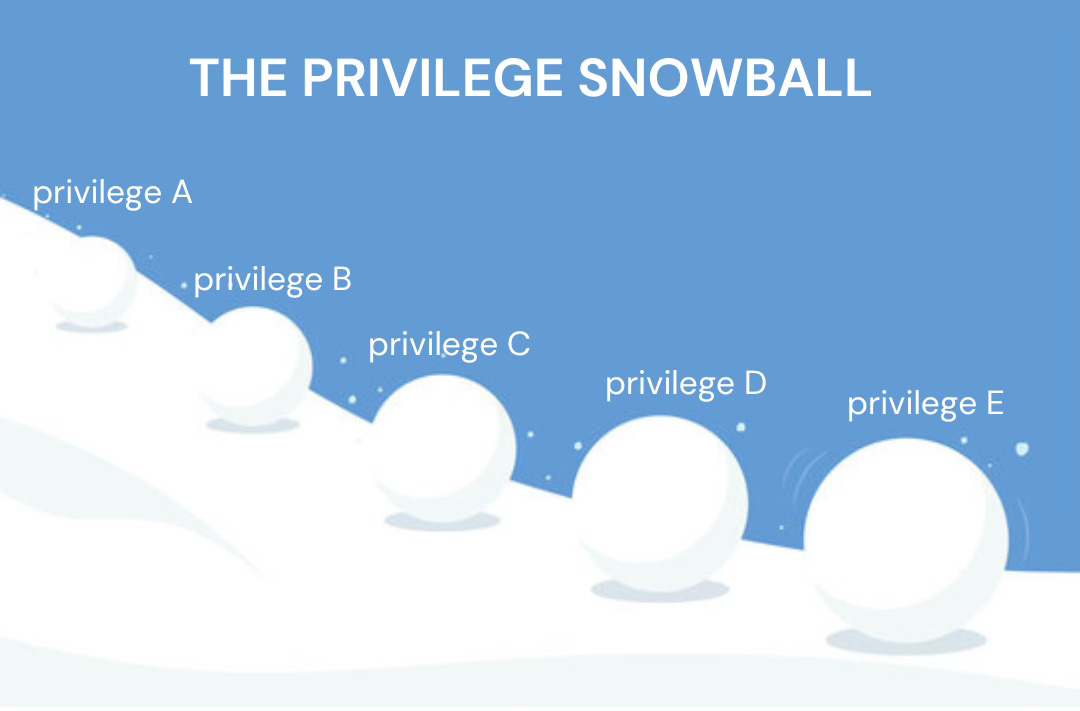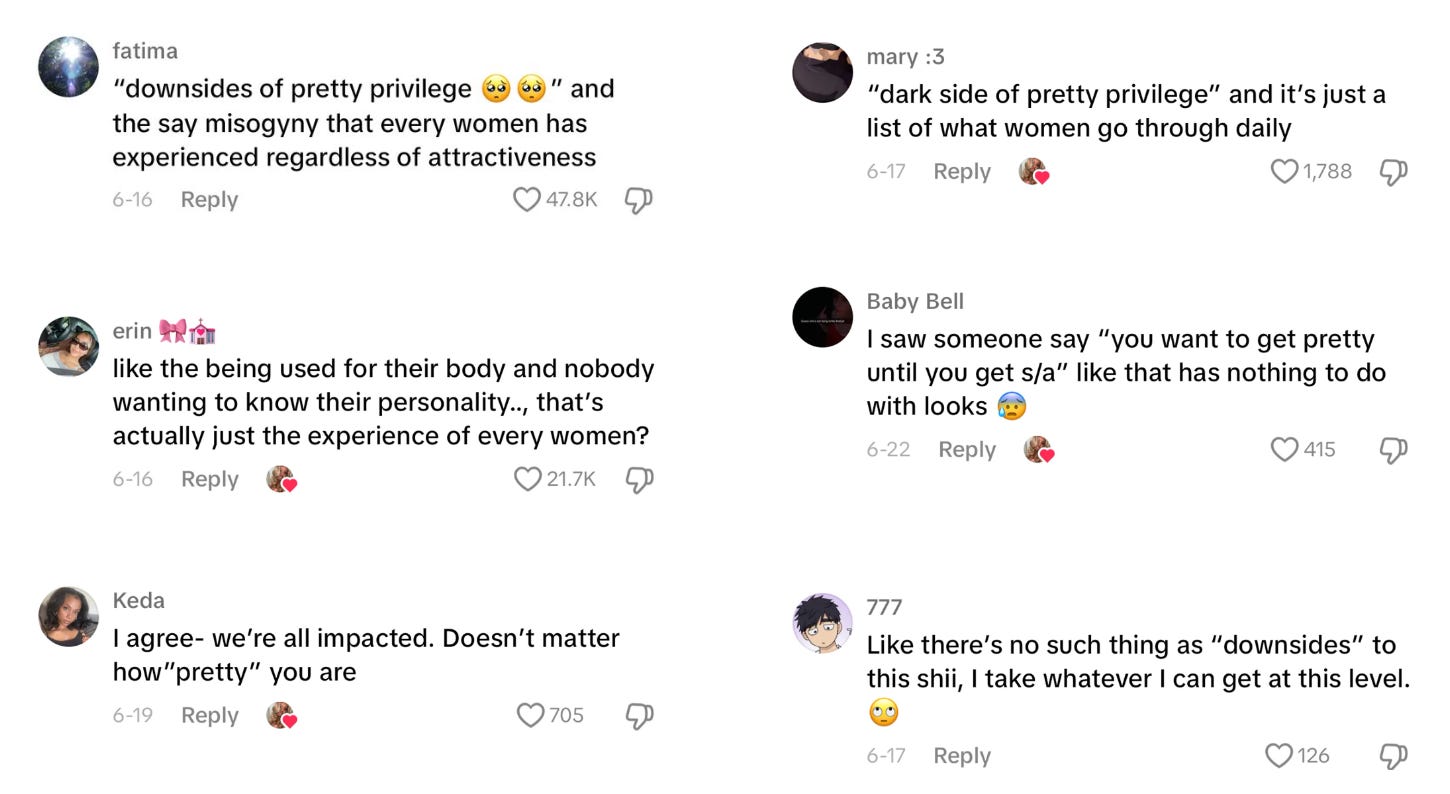🤎this week on the Spoiled Girlie Support Group🤎
the rise of PRINCESS TREATMENT - from Tiktok trend to a women’s movement
📖besties book club📖
Pachinko
🍵the tea🍵
“the downsides of pretty privilege” is just misogyny
On today’s support group session, we are exploring the quote on quote “downsides of pretty privilege” and if they really are downsides unique to pretty privilege or if they are downsides unique to womanhood. Pretty privilege, although it has real effects on the real lives of real people, may seem to elevate certain women, but it only elevates women above other women, not above men. In short, it’s still a tool used to control women’s behavior to the detriment of womanhood in general. It’s still a way of keeping women in auditioning energy; it’s still a way of making us pickmes for the patriarchy.
And I know we’re spoiled girlies; we don’t get mad, we get paid, but also we’re growing up a little bit. We are in our individuation era; instead of selfish individualism or blind collectivism, we are riding that middle ground—how to create good in our lives and the lives of other women, as best as we can.
So let’s start with a video that irritated a lot of people’s souls recently:
In @rylie_shaw’s tiktok video titled “reasons why being pretty actually sucks,” Shaw talks about how being very attractive comes with several disadvantages, despite the common belief in "pretty privilege." Beautiful women often aren't taken seriously, facing stereotypes that one cannot be both smart and beautiful. They are frequently overlooked for jobs and promotions and face medical issues being dismissed due to assumptions that good looks equate to good health. This can lead to mental struggles as their value is often tied to their appearance rather than their intelligence or skills. Aging becomes difficult as their beauty fades. Studies show models, seen as epitomes of beauty, have higher rates of mental health issues and lower life satisfaction. Socially, being very attractive can be a barrier, as they are often perceived as unapproachable or stuck-up, leading to isolation from others. Additionally, extremely attractive women are less likely to be approached by men, who assume they are out of their league. They also face higher levels of objectification and unwanted attention.
And people were not at all about this:
two things can be true at the same time
Two things can be true at the same time: pretty privilege is real and the “downsides of pretty privilege” although real, reflect the female experience more than they do the “attractive” female experience.
In essence, the “downsides of pretty privilege” is just plain old misogyny that punishes women for simply being women. And this beauty we are taught to seek does not make us immune to misogyny. It just makes us subject to a different version and frequency of misogyny.
pretty privilege exists
It is true that pretty privilege exists; there have been countless studies on the halo effect, aka the positive attribution effect, and how pretty people have such a chokehold on us.
The halo effect is a cognitive bias which can prevent someone from forming an image of a person, a product or a brand based on the sum of all objective circumstances at hand.
The term was coined by Edward Thorndike. A simplified example of the halo effect is a person, after noticing that an individual in a photograph is attractive, well groomed, and properly attired, then assuming, using a mental heuristic, that the person in the photograph is a good person based upon the rules of their own social concept. This constant error in judgment is reflective of the individual's preferences, prejudices, ideology, aspirations, and social perception.
—Wikipedia
@qovesstudio listed “10 mind-blowing evidence-based facts about pretty people.”
attractive individuals tend to earn 3 to 4% more than their less attractive counterparts a phenomenon known as the beauty premium in economics
In politics attractive candidates typically receive 20% more votes than less attractive opponent. This reminds of the presidential debate between JFK and Nixon which was the first ever presidential debate to be televised. Here’s the tea:
When Nixon arrived for the debate, he looked ill, having been recently hospitalized because of a knee injury. The vice president then re-injured his knee as he entered the TV station, and refused to call off the debate.
Nixon also refused to wear stage makeup, when Hewitt offered it. Kennedy had turned down the makeup offer first: He had spent weeks tanning on the campaign trail, but he had his own team do his makeup just before the cameras went live. The result was that Kennedy looked and sounded good on television, while Nixon looked pale and tired, with a five o’clock shadow beard.
The next day, polls showed Kennedy had become the slight favorite in the general election, and he defeated Nixon by one of the narrowest margins in history that November. Before the debate, Nixon led by six percentage points in the national polls.
—constitutioncenter.org
It is also interesting to point out that people who listened to the debate on the radio thought Nixon won the debate while people who watched the telecast thought JFK won.
In the end, JFK wins the election, cementing the importance of a candidate’s visual representation in swaying public opinion.
Attractive people are more likely to be perceived as intelligent even when there's no correlation between appearance and actual intelligence.
Unattractive criminals go to jail for twice as long as attractive criminals. Remember Jeremy Ray Meeks? the hot mugshot guy?
Jeremy Ray Meeks, born February 7, 1984, is an American fashion model, actor, and convicted felon. A former Crips gang member, he was arrested in 2014 during a gang sweep in Stockton, California. His mugshot, posted on Facebook, went viral due to his attractive appearance. Convicted on federal charges of being a felon in possession of a firearm and grand theft, he was sentenced to 27 months in federal prison and ordered to participate in a substance abuse treatment program. Meeks served 13 months and was released in March 2016. Upon his release, he began a successful modeling career, having been noticed by modeling agencies due to his viral mugshot (Wikipedia).
In one study 72% of hiring managers admitted that a candidate's appearance influenced their decision and one in five employers admit to rejecting job candidates based solely on their appearance.
Attractive infants which is mind you not our words but the term used in the study received 50% more attention from their mothers compared to less good looking infants.
For every inch of height above average a man's annual salary increased by approximately $789.
Attractive people have a 14% chance to have higher IQ than less attractive individuals.
In speed dating events physical attractiveness was four to five times more important than income in determining whether someone received a follow up date request.
People can tell your social class and if you are rich just by looking at your face.
Like I said, two things can be true at the same time: that pretty privilege is real and has a real effect on real people’s lives. But it can also be true that pretty privilege as a woman does not protect you from misogyny. At the end of the day, it doesn’t protect you from being a woman.
A pretty woman is still, at the end of the day, a woman existing within and under patriarchy. So you’re still on the receiving end of misogyny, just a different version of it.
a note for the spoiled girlies
The vibe in the spoiled girlie support group is never hopelessness, okay? Whenever I listen to or read people’s essays on certain topics, I’m always left with “what now?” So, should I just not exist then?
The cynicism-to-nihilism-to-moral-narcissism pipeline is so real, and I don’t ever want to get caught up in that. So, even though we talk about difficult topics here, I like to remind myself and you as well that life is amazing. The world has so much to offer us girlies.
It is so amazing being a woman. I love being a woman. I wouldn’t want to be anything else; I wouldn’t want to be anyone else. There’s so much joy to be had in this world. I just want to remind ourselves that it is such a beautiful day to be alive. It is such a beautiful day to share my thoughts and my vibes with the girlies. It is such a beautiful day to live as a woman. You are blessed. You are favored. You are protected. And you are on the side of the divine. Okay?
I never want you to leave here feeling hopeless. Verbalization is validation. By saying things out loud, giving words to the things we are feeling but cannot express, that gives us hope. By giving language, giving life to the things that are bothering us girlies, we get to bond over it and we get to strategize how we will move best in the world. That’s it.
I’m done being sad and being mad. No. We’re getting paid, and we are helping all the other girlies get paid too.
Back to the topic, the vibe is don’t get mad, get paid. At this point, we are all aware that pretty privilege is real and has real effects on the real lives of real people. As it turns out, pretty privilege or beauty privilege is prized in society because it is a social reproduction tool.
pretty privilege as a social reproduction tool
In @cece.archetype’s tiktok video, Cece discusses the French book Le Poids des Apparences. The book explores deeper aspects of attractiveness and social dynamics. The author explains that what we consider attractive is culturally constructed and that appearance serves as a tool for social reproduction, similar to how children of lawyers often become lawyers themselves. Historically, clothing signified social class, but today, physical appearance has become the primary indicator, with body shape, fitness, and mannerisms playing key roles.
The book discusses whether attractive people fare better in life, confirming that from childhood through job interviews, attractive individuals receive preferential treatment. An interesting aspect is the role of beauty in mating strategies, where couples with similar levels of beauty are more likely to have serious relationships. If there's a significant beauty disparity, long-term commitments like marriage are less likely.
The author also notes that a woman from lower social classes won’t fully benefit from her beauty when seeking upward mobility through marriage unless she also has academic achievements. The book, reflecting early 2000s perspectives, suggests that good looks alone aren’t enough for a “good marriage” without education, a viewpoint that may feel outdated in the age of social media like Instagram.
—and this gets us to what i like to call “The Privilege Snowball”
privilege begets privilege
As you can see here in this graphic I made for our class, privilege begets privilege.
You get yourself a tiny little privilege, and as you roll down the mountain, you pick up other privileges until you become an amalgamation of all these privileges, and before you know it, you’re Little Miss Privilege, Little Miss Elite Class Member. That’s literally the privilege game, that’s literally the wealth game, that’s literally the game of life.
This is why the privileged get even more privilege, get even more money. And why people who give themselves whatever form of privilege—either scholar privilege or education privilege or cultural privilege or pretty privilege—they are more likely to get financial privilege.
Out of all the privileges, a less privileged person can theoretically earn pretty privilege. You cannot go back in time and be born into a wealthy upper-middle-class, upper-class family, but you can theoretically fit the prescriptive beauty norms and earn yourself pretty privilege, which would, in turn, theoretically, earn you even more privilege.
In Elizabeth Currid-Halkett’s book A Theory of the Aspirational Class, Currid-Halkett writes,
“Culture is a resource used by elites to recognize one another and distribute opportunities on the basis of the display of appropriate attributes.”
—Elizabeth Currid-Halkett, The Sum of Small Things
And the elites, as talked about in this specific book, are the NEW ELITES—the creative class labor market elites of the aspirational class. These are basically people who use knowledge as tools to, number one, distinguish themselves from non-creative class labor market elites, and number two, to reproduce even more of their privilege.
This reproduction of privilege is not unique to this “new elite.” This has always been the case for all elites. Privilege begets privilege because people will always want to reproduce their own privilege via the people they deem are similar to them. So I would take this a step further and propose that…
Beauty is a resource used by elites to recognize one another and distribute opportunities on the basis of the display of appropriate attributes (i.e. knowledge, the cultural capital, the cultural knowledge to conform to prescriptive beauty norms all while publicly disavowing said beauty norms)
—Elle Ray
In a world where knowledge is king, the knowledge, the cultural capital, the cultural knowledge to conform to prescriptive beauty norms all while publicly disavowing it, all that is the desired appropriate behavior. I’ve been doing research on this topic for a while now, and it cracks me up that many of the people who were giving their takes on beauty standards and pretty privilege and all these topics complain about it, all while fully fitting the beauty standard, all while benefiting from pretty privilege, all while following the prescriptive beauty norms. Like… okay.
Let me say the quiet part out loud. It’s okay to admit that we are all under pressure to conform. It’s okay to admit that we’re not above that, that we’re just regular degular women who will earn whatever privilege we can earn. This denial of the existing pressures to conform is signaling either immense existing privilege or ya’ll are lying. It’s okay to say that you want to be XYZ for the sole purpose of fitting the beauty standard. We already talked about this in the “Being Skinny Is the Ultimate Manifestation - Exposing How the World Sees Us” class. It’s okay to want to be skinny for the sole purpose of being skinny.
Because, as evidenced by our own personal experiences and by all these scientific studies, fitting the beauty standard does make life easier, does confer even more privilege onto you. And is that so bad to want? No, it’s not. So we need to get off our high horse thinking that we’re above all this when we’re not. We live in a world where people 100% absolutely judge you by your appearance, and that’s that. So either you get mad about it or you get paid.
And as I said earlier, we are in our individuation era, so be in discernment.
men are not “visual creatures”
With all that being said, here’s something else I’ve been ruminating on. Why are women disproportionately affected by the pressures to follow the beauty standards, the prescriptive beauty norms? Why are men so emboldened, literally feel like it’s their birthright to judge women’s appearance? Like, we care what they have to say?
Case in point: men calling women “mid” as an insult. They call women “mid” as an insult because to them, the average man is ugly.
The “mid” insult has always baffled me. The average woman is radiant, is beautiful, so full of joy and light. Why would I not want to be an average woman? And as with everything with these below-bare-minimum low-effort people, it’s projection.
They think “mid” is an insult for women because being called “mid” is an insult for men. They don’t want to look like the average man because, to them, the average man is ugly.
Like, I swear it’s really giving NPC because whenever I go into a woman’s comment section, there they are—literal bots commenting “mid” and “says the 3” on obviously beautiful women’s content, on content that should have nothing to do with a woman’s appearance.
Anyway, I remember someone said that “if men were such visual creatures… then why do they look like that?”
I mean… and honestly, it all boils down to entitlement.
In The Beauty Myth by Naomi Wolf, Wolf writes
The beauty myth tells a story: The quality called “beauty” objectively and universally exists. Women must want to embody it and men must want to possess women who embody it.
—Naomi Wolf, The Beauty Myth
Wolf also touches on why women are disproportionately affected by the beauty myth and why men are not pressured as much to conform to the beauty standards.
Genesis explains why it is women who often need to offer their bodies to any male gaze that will legitimize them. “Beauty” now gives the female body the legitimacy that God withheld. Many women don’t believe that they are beautiful until they win the official seal of approval that men’s bodies possess in our culture simply because the Bible says they look like their Father. That seal must be bought or won from a male authority, a God the Father stand-in: surgeon, photographer, or judge. Women tend to worry about physical perfection in a way men seldom do because Genesis says that all men are created perfect, whereas Woman began as an inanimate piece of meat; malleable, unsculpted, unauthorized, raw—imperfect.
—Naomi Wolf, The Beauty Myth
And this makes so much sense!!!
As we talked about in the “God Is a Woman” class, the myths, the stories, the lore we tell each other and ourselves have a way of working into our psyche, of informing how we see the world and consequently, ourselves. The Genesis story of creation, essentially creating woman from man, establishes men as the standard— as the arbiters of what is normal, what is beautiful, what is human. And so men have held this power and strategy of objectifying and dehumanizing women to justify our ill treatment, our violation, our literal obliteration sometimes, and that of our children. So this goes way deeper than if a man thinks you’re pretty, okay?
Now that we have established that pretty privilege exists and is real and has a real effect on real people’s lives, let’s talk about how pretty privilege as a woman may protect you from misogyny temporarily. But as evidenced by the “downsides of pretty privilege,” you can never really escape misogyny; you can just be subject to a different version of it.
“downsides of pretty privilege” is just misogyny
It's so funny to me when I see these videos that are like the dark side of pretty privilege. And then you read it and it's just like things that every woman goes through… It's like it doesn't have anything to do with you being pretty or not. That's just every girl…
—@cuteblondeandsweet on Tiktok
Pretty privilege is real, but the supposed “downsides” aren’t unique to pretty privilege. The downsides of pretty privilege are just the downsides of being a woman. The downsides of pretty privilege are just plain old misogyny. The downsides of pretty privilege are just the literal female experience.
And I would warrant that pretty privilege actually protects you, allows you to bypass the more common and more frequent manifestations of misogyny towards women. Because women with pretty privilege are less often subjected to “everyday misogyny,” it’s disorienting and extra hurtful when they do experience it. That’s why women who claim they have pretty privilege are the ones who are most vocal about the downsides of pretty privilege.
It’s like getting pie’d in the face. If it happens to you all the time, you wouldn’t complain about it. But the one time you do, it’s big news. Same thing with pretty privilege and misogyny.
Now let’s get into the comments:
If you’ve ever not fit the beauty standard before and all of a sudden you do, you would find it absolutely disgusting, absolutely revolting the things you learn about people. Like, people—even the nicest people you know—treat you differently before and after your quote on quote glow up.
I mean there is… it’s called being a woman.
We love a self-aware queen!!! Yeah, I mean, we are literally wired to seek beauty in everything—in nature, in people, in music, in language, in food. We are beauty whores ngl.
Let’s get into another take
“most of yall r not pretty enuf to complain about “pretty privilege” i’m ngl. what you’re experiencing is misogyny and trying to turn it into a humble brag is so lame”
—@howufeelinbecky on Tiktok
I mean… that’s a statement for sure…
let’s get into the comments.
It’s not “downsides of pretty privilege.” It’s literally just being a woman. The bad things “pretty girls” experience are literally things all women experience. I think the day we stop othering each other, we can actually make meaningful change in how we perceive ourselves. And in turn, how we show up in the world, and in turn, how we influence the world.
The beauty myth is always actually prescribing behavior and not appearance. Competition between women has been made part of the myth so that women will be divided from one another… Most urgently, women’s identity must be premised upon our “beauty” so that we will remain vulnerable to outside approval, carrying the vital sensitive organ of self-esteem exposed to the air.
—Naomi Wolf, The Beauty Myth
And that’s what this is all about—it’s control over women. So while we do acknowledge this pressure, this need to conform, and actually do conform, along with countless other women fueling billion-dollar beauty industries, we are now aware of the need to do something about the disparity in this need to conform to contemporary beauty standards, this need to partake in the attainment of pretty privilege or beauty privilege.
Why are men quote on quote visual creatures yet they look like that? Why is there more pressure on women to look good? On top of the existing pressure for women to also be good at capitalism for our literal survival? We have to look good doing it too! Why?
The vibe is individuation. The vibe is we’ll get into positions of power in culture and do something about it. The vibe is individuation. The vibe is don’t get mad, get paid, and don’t step on your sisters along the way.
Now get that bag, bestie.
-Elle.

